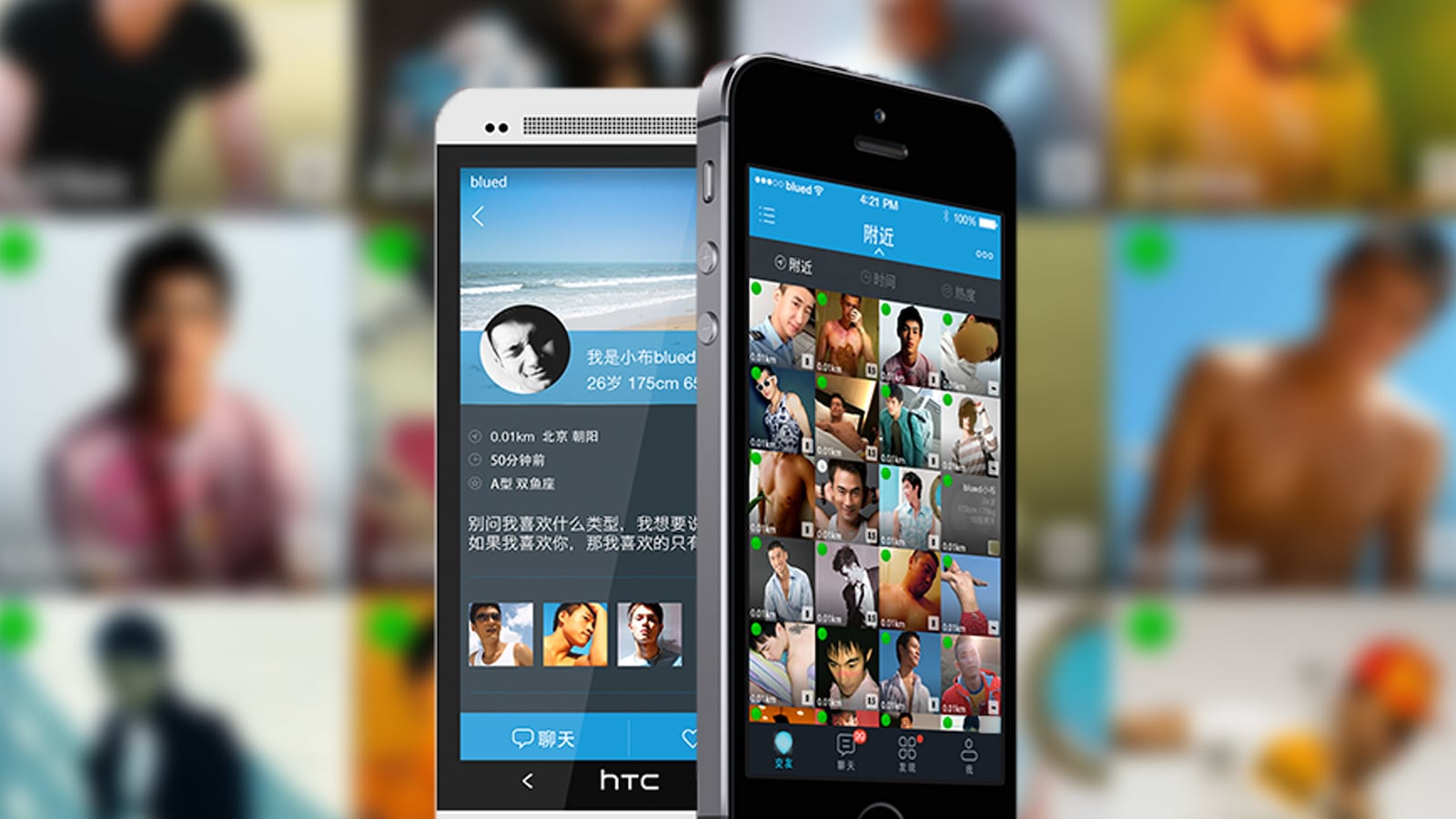With homosexuality outlawed until 1997 and defined as a mental disorder until 2001, China’s version of Grindr was always going to create a stir. But Blued—a gay hook-up app now used by 15 million people across the country—has done more than that, growing its community more than seven-fold in the two years since its launch and, as of this week, attracting a $30 million cash injection from venture capitalists DCM. For a country forever cracking down on those perceived as veering from the sexual norm, being gay is finally starting to pay.
Blued isn’t the first gay app to hit China, but it’s certainly making its mark—and with increasing popularity in Beijing, Shanghai, and Guangzhou a strong indication of its ability to succeed elsewhere in the world, creator Geng Le’s vision to create a “global gay application” is well underway. While the likes of Zank, which is quite clearly marketed toward homosexuals but has previously shied away from explicitly admitting this, Gee Yu, and Laven are all solid competitors in the market, it is Blued’s open approach to gay dating that seems to have secured its path to success.
“In China, Blued, providing divided network services for the minority, has shown not only its business success, but also its diversified and love-oriented social value [sic],” Geng said in a statement.
And the recent news of Tim Cook’s coming out will continue to strengthen the app’s hold, Geng believes. “As Cook has indicated in his open letter, if people who are suffering from the gender dilemma or who feel lonely and eager for equal rights can be comforted by hearing the fact that the Apple CEO is gay, then it is worthy for me to surrender my privacy.”
Though there are signs of improvement in China’s acknowledgement of homosexuality, there is still much to be done. Currently, there is no legislation in place to protect harassment or discrimination toward gays, and adoption for same-sex couples is not allowed.
“‘Gay Beijing’—I’m not sure there is such a thing,” said Rupert-Angus Mann, who lived in the country’s capital for a year. Writing on a tourism site about attitudes to homosexuality in China, he explained: “For the Chinese, being gay means very little about who you are, and Beijing’s gay community is often quite reserved. You will not find many people who feel the need to broadcast their sexuality. Actually, it is often the opposite.”
Perceptions may be slowly changing, but a vast number of gay people in China still seek ways to shield the truth about their sexuality. Co-operative marriages—where gays of both sexes find perfunctory partners purely for the sake of a wedding certificate—are rife, serving as a mutually beneficial beard for those whose families would struggle to deal with their children abandoning heterosexuality. These artificial unions (which are estimated to take place between as many as 90 percent of Chinese homosexuals) have increasingly become an answer for those fearing getting found out by a straight spouse, and also enable makeshift couples to fulfil the obligations of the country’s reproduction policy.
Blued’s founder is optimistic, though, that the rising amount of investment into gay apps is proof that China is becoming more accepting of its people. “Blued was granted funding three times just within 16 months, and its value assessment has gone far beyond some heterosexual social applications,” the app’s parent company, DanLan, said. “Our development will let more people know the value of the gay network, and the diversity and progress of Chinese society.”
It’s no secret that dating apps are big business globally, but China’s vast population means that the pool for potential romance runs somewhat deeper. One of the country’s leading matchmaking sites, Jiayuan, now has 100 million users, and the fast-growing membership of relationship apps including WeChat, Momo, and YY Voice means that the area is an increasingly fertile ground for similar services to spring up.
Much of their success has been attributed both to rebellion against strict familial expectations of marriage and child-rearing, as well as the need to expand their social circle in the absence of siblings’ friends. But it has also encouraged citizens to approach the search for love in a new way entirely, with government-ordained rules about the nature of romance across many East Asian countries forcing dating to enter a new dawn.
Encouraged by China’s growing disassociation with the strictures of old, businesswoman Wu Di set up her own three-month dating camp schooling the country’s relationship-hunters on how to find a match. “Young people have higher expectations for marriage now,” she told The Atlantic. They want attraction, and their parents don’t know what that is.”
The country has also begun to dabble in the world of virtual girlfriends, with shopping website Taobao offering such services for less than $5 per day. Users can pick from “doll-like girls” and “mature women,” among others, and is thought to have gained popularity as a result of China’s unfavorable gender ratios toward men (official statistics say there are 118 for every 100 women).
These, coupled with government-organized matchmaking events that often attract visitors in the tens of thousands, show a slow but steady maneuver in how the country views dating across the board. And, with an estimated 70 million gay people in China, there has never been a more salient time to turn the corner.






